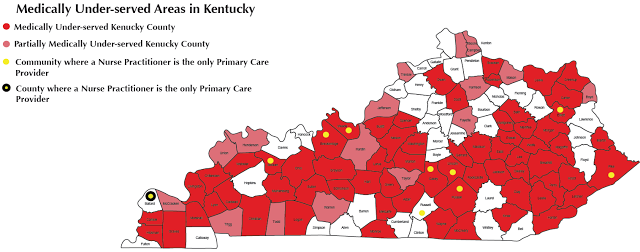Legislature eases physician assistant rules; nurse practitioners’ prescription power, Medicaid prompt-payment bills, others linger

Kentucky Health News
The Kentucky General Assembly has joined other states in easing the restrictions on physician assistants’ medical practice, but has held up a similar move for advanced registered nurse practitioners. Both issues relate to the shortage of medical practitioners in many Kentucky counties, and the quality of medical care.
The Senate added the physician assistant language of Senate Bill 43 to House Bill 104, an art-therapy bill, in order to preserve an agreement between the Kentucky Medical Association and the Kentucky Academy of Physician Assistants. It will repeal the law that bans PAs from practicing for their first 18 months unless a physician is on site; one will still have to be available by telephone. The amended bill has been sent to Gov. Steve Beshear for his signature or veto.
The amendment was used because the House had tacked onto SB 43 an amendment from advance practice registered nurses that would have repealed the need for them to have a collaborative agreement with a physicians to prescribe non-narcotic drugs. The KMA opposes that idea.
“It’s looking like the doctors win,” said Sen. Julie Denton, R-Louisville, who favors the repeal. “I’m not hopeful” it can pass, she said, but added that some physicians also favor it: “With Obamacare coming in, we’re going to need all the front-line physicians we can get.” Leading opponents of the measure, Republicans Katie Stine of Fort Thomas and Carroll Gibson of Leitchfield, didn’t return a call seeking comment.
Nurse practitioners say that SB 43 is necessary to allow them to fill health-care gaps in rural Kentucky and address the state’s shortage of primary-care providers. The Kentucky Coalition of Nurse Practitioners and Nurse Midwives says in an article prepared for Kentucky newspapers that NPs have never been required to practice under physician supervision and 17 states allow full prescribing authority for non-scheduled medications.
The Medicaid prompt-payment bill, HB 5, went to a conference committee after the House refused to go along with Senate changes, and may be considered when the legislature returns later this month, ostensibly to consider any bills Beshear vetoes. The bill would apply prompt-payment laws to managed-care organizations and would move Medicaid late-payment complaints to the insurance department; those are now handled by the Cabinet for Health and Family Services, which administers Medicaid.
In the final crunch to pass legislation before the veto recess, lawmakers attached seven health care-related bills to HB 366, which had focused on identifying congenital heart disease in newborns. It had 10 additional measures “hung on it like a Christmas tree before the free conference committee of House and Senate members,” reports Ryan Alessi of cn|2’s “Pure Politics.”
The bills still hanging on the measure, dubbed the “healthy Christmas tree,” are:
- HB 187, addressing a free prescription-drug program for under-insured Kentuckians.
- HB 79, which would exempt licensed health care providers from being disciplined for prescribing naloxone in the event of an overdose.
- HB 387, which aims to provide nutritional supplements for low-birth-weight newborns.
- SB 201, which addresses licensed diabetes educators.
- SB 38, to require Medicaid to accept provider credentialing by a Medicaid managed-care organization.
- SB 108, relating to managed-care contracts with the IMPACT Plus program, a behavioral health program for children.
Kentucky Health News is an independent news service of the Institute for Rural Journalism and Community Issues at the University of Kentucky, with support from the Foundation for a Healthy Kentucky.

The blog article very surprised to me! Your writing is good. In this I learned a lot! Thank you! I like the way you blogged about this topic.
Prescription Medicine Alternatives